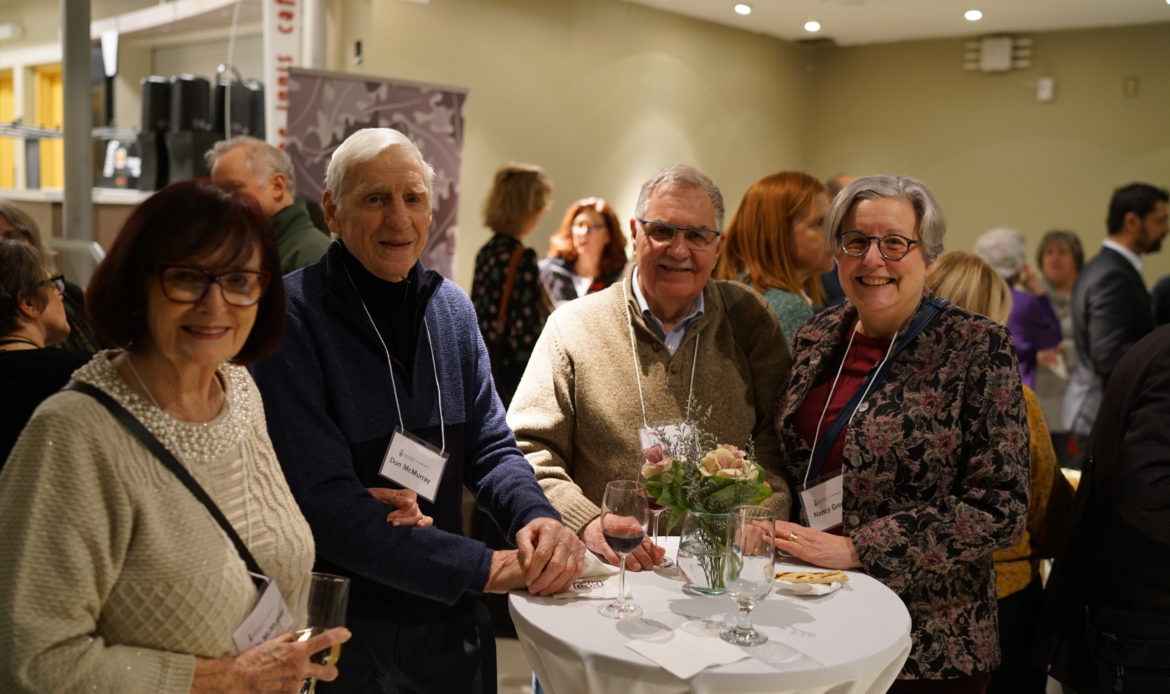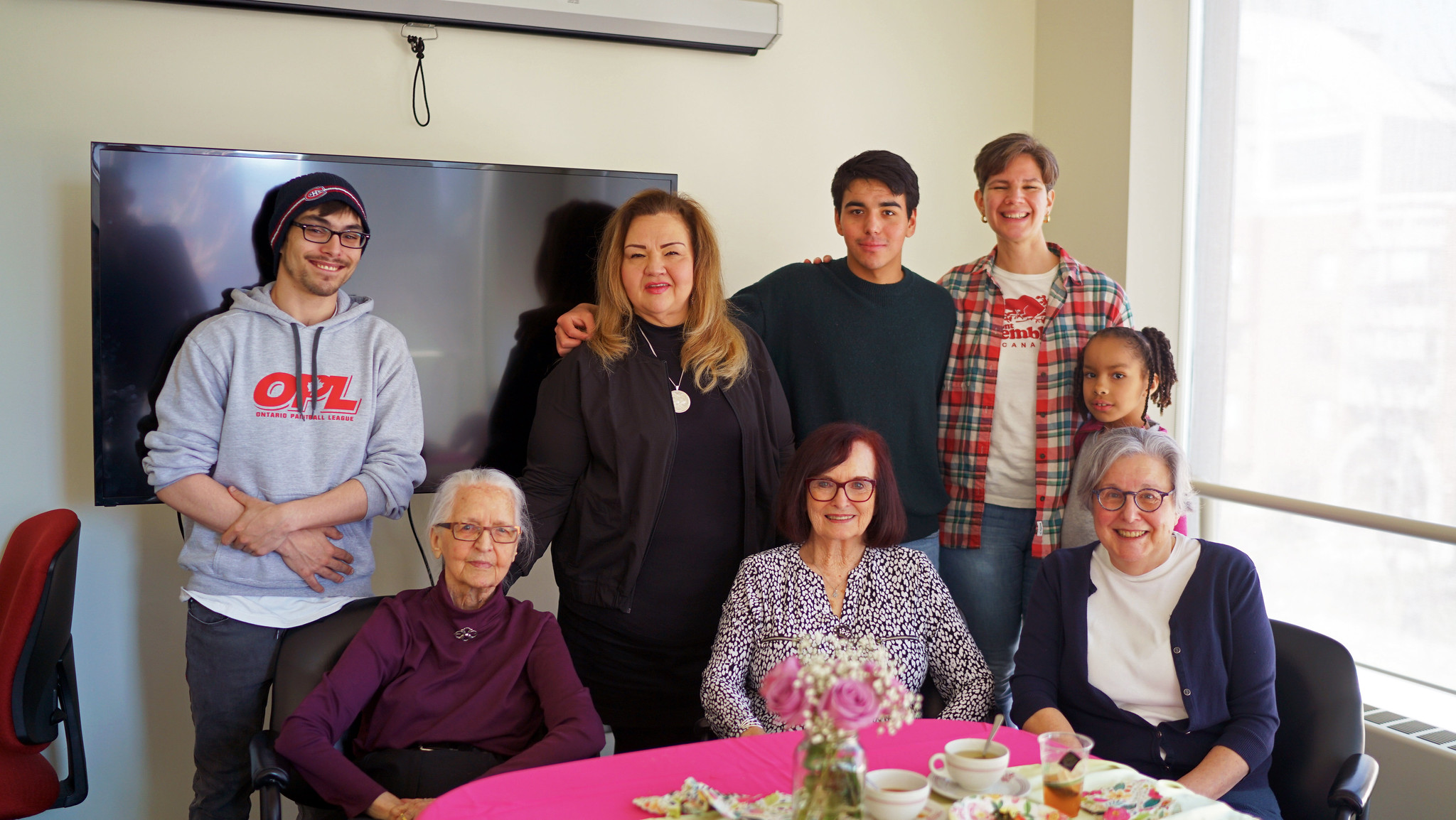Inspiring a lifelong commitment to learning
On any given day, you can see Innis students, staff, and faculty bustling around the College, creating the vibrant sense of community that I instantly fell in love with here at Innis. But there’s another group that calls Innis home and is deeply interwoven into the fabric of our community—the Later Life Learners.
Every semester, the Later Life Learners can be found listening attentively to one of several lectures in town hall, hosting group discussions in the Innis Residence Events Room, mingling in the Innis College lobby, or chatting with friends over lunch at the Innis Cafe. Spending more time in Town Hall than the average Innis student, the Later Life Learners are a testament to the benefits of forming strong bonds between the college and our surrounding community.
As an Innis student who has frequently run into the Later Life Learners during my four years here, I was keen to learn more about the program. I sat down with Merle McMurray, current President of Later Life Learning, to find out more about the program’s history, operations, and the benefits it provides to both its members and the Innis College community.
The Later Life Learning program was founded in 1981 and currently serves over 1600 members, all of whom are retirees. The program offers seven lecture series per year—four in the fall and three in the winter—on a wide range of ever-changing topics. This year’s winter courses include: Best of Ballet, taught by ballet-enthusiast and formed Canadian Oxford Dictionary editor Katherine Barber; A Guide to the Outer Edges of Cinema, taught by award-winning Canadian filmmaker Guy Maddin; and Black History in Canada, taught by Channon Oyeniran, Vice President of the Ontario Black History Society. Lecture series, which run for ten weeks, cost a modest $60 for members and often fill up within minutes of the online registration opening.
Merle joined Later Life Learning in 2001 after hearing about the program from a friend of a friend. She was able to get a spot in an under-enrolled course entitled “Water” in the winter of 2002, which then allowed her to bypass the lengthy waiting list and join the in-demand program. She’s been an active member and never missed a session since.
The program has evolved in many ways over the almost twenty years that Merle has been involved in Later Life Learning. About ten years ago, Later Life Learning began offering a new program: a weekly Current Events discussion group. The Current Events group, capped at 35 members, meets once a week in the Innis Residence events room and discusses a different topical issue each week. The topics are chosen by participants at the first session and each week one member will give a presentation to the rest of the group and facilitate a group discussion. The group occasionally brings in guest speakers, but Current Events is primarily curated and delivered by Later Life Learners themselves.
Another recent development to the program has been the formation of the Books & Beyond discussion group. This course started two years ago and is similarly self-directed. Members choose four books to read over ten weeks and participants take turns leading the course presentations which alternate between discussions of the book itself and of topics inspired by the books. This course is similar to a book club and as such its registration is capped at twenty people to help facilitate lively discussion. These smaller discussion groups cost only $40 per session.
Offering eleven programs per year to hundreds of members is no easy task and requires dozens of dedicated volunteers. At the core of the program is the Later Life Learning Board of Directors, a team of twenty volunteers that oversees everything from registration, to facilities, communications, donations, and finance. The Board is also responsible for coming up with potential topics for the upcoming year’s lecture series—planning that begins a full year in advance. The Board of Directors is supported by two paid staff—one program coordinator who finds lecturers based on the Board’s topic suggestions and another staff person who helps in the office as needed. The program is also supported by other volunteer members who assist with lecture check-ins, hosting speakers, and coffee service.
Merle is now in her second year as President of the Later Life Learning Board of Directors. Coupled with her nearly twenty years of experience with the program, she had incredible insights to shed on not only the history and operations of the program, but the benefits it creates for both its members and the wider Innis College Community.

COURTESY of INNIS ALUMNI
Later Life Learning of course provides members with excellent courses that enrich their learning and expand their worldviews. Perhaps a more important element of the program, however, is its ability to expand its members social circle and provides a strong sense of community and belonging. “As we age, we lose a lot of our friends,” Merle noted. She recognizes that “new friends will never be the same as old friends,” but Later Life Learning “creates an opportunity [for members] to meet new people and engage with other people in [their] age group.” Many members of the program, Merle included, have developed incredibly strong friendships and met people with fascinating life stories through Later Life Learning.
While being around people their own age is certainly a benefit of the program, the fact that Later Life Learning takes place in Innis College means members also get to be around university students. “It’s nice to be around young people and hear about their plans for the future,” Merle remarked, commenting on how enjoyable it is to see Innis students engage with various College boards, clubs, and councils.
Merle also talked in detail about the strong partnership between Later Life Learning and Innis College. She’s most proud of the money that Later Life Learning has raised to directly support Innis students through various scholarships. She told me that the regular scholarship fund is “very healthy,” containing an endowment of “well over a million dollars.” This money is used to support over 70 scholarships that are awarded to students based on academic achievement and financial need each year. Last year, Later Life Learning also made an endowment to create a scholarship specifically for Indigenous students.
Later Life Learners also routinely support Innis’s Refugee Student Fund, having raised over $90 000 to directly support refugee students. They’re enthusiastic audience-members at the annual Innis College Benefit Concert and also host their own fundraising events throughout the year.
While Later Life Learning provides many benefits to the College, the relationship is certainly “a two-way road.” The College frequently supports the Later Life Learning program, whether through its “wonderful staff” or by helping secure lecturers for upcoming lecture series. One of the current courses, A Guide to the Outer Edges of Cinema, came to be through Later Life Learning’s connections with the Cinema Studies program. “Later Life Learning certainly gets benefits from its partnership with the College,” Merle said. “Innis is very familiar and friendly,” making it the perfect host for the Later Life Learning program.
Having taken dozens of courses at Innis, I asked Merle what her all-time favourite lecture series was. “It would have to be a course I took on Italian Cinema in the 40’s,” Merle said.
Merle gave me a sneak-preview of the upcoming fall lecture series. Later Life Learners can look forward to courses on China, ethics and the environment, ten important Canadians, and a course on the history of espionage (Merle thinks this one will be the crowd favourite come registration time). As always, the future of Later Life Learning is looking bright.
My friends and I like to joke that we’ll know we’ve made it in life if we become Later Life Learners one day. In reality, this is a comment made more in seriousness than in jest. I hope to be as active, inquisitive, and passionate as the Later Life Learners when I’m retired. This dynamic community serves a reminder to twenty-something students like myself that learning is a lifelong exercise and that education can be pursued joyously and communally if dedicated, enthusiastic people come together and make it happen.
If you’re interested in learning more about the Later Life Learning program, you can visit their website at http://sites.utoronto.ca/innis/lll/. You can join the waitlist for the Later Life Learning program by sending your information to lll.innis@utoronto.ca.
Note: This article was corrected on March 2nd, 2020 to reflect the accurate price of a LLL course.
